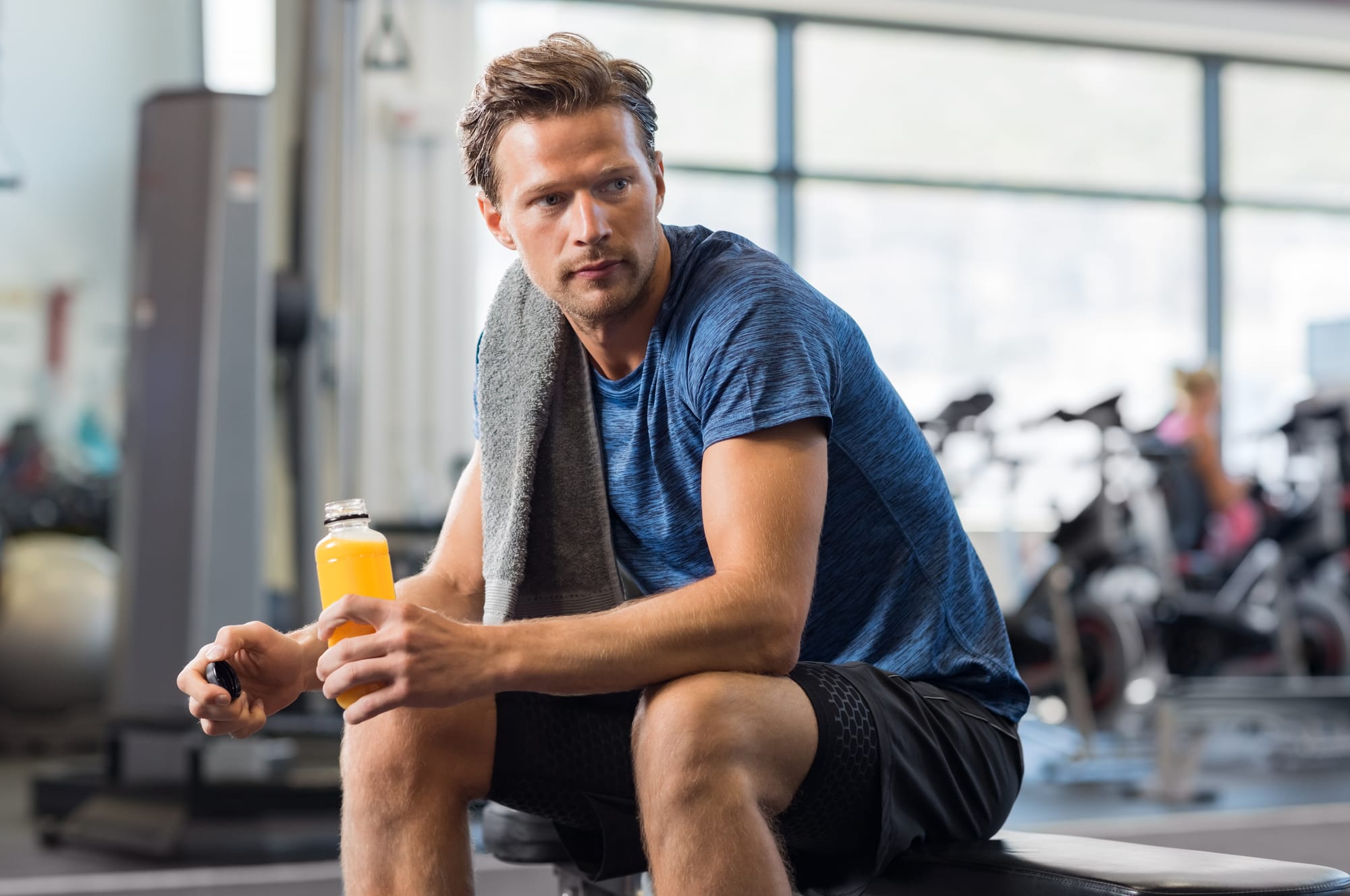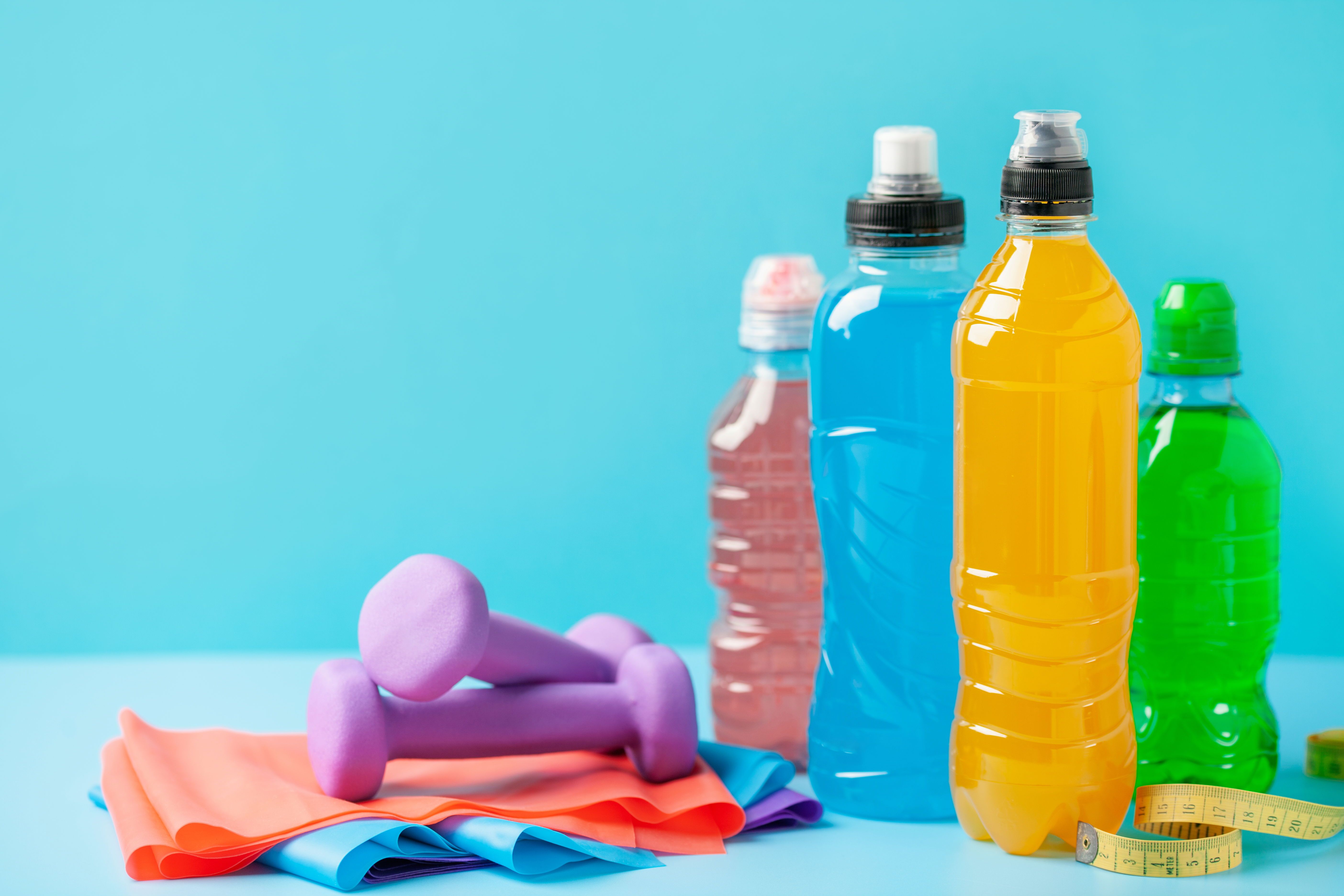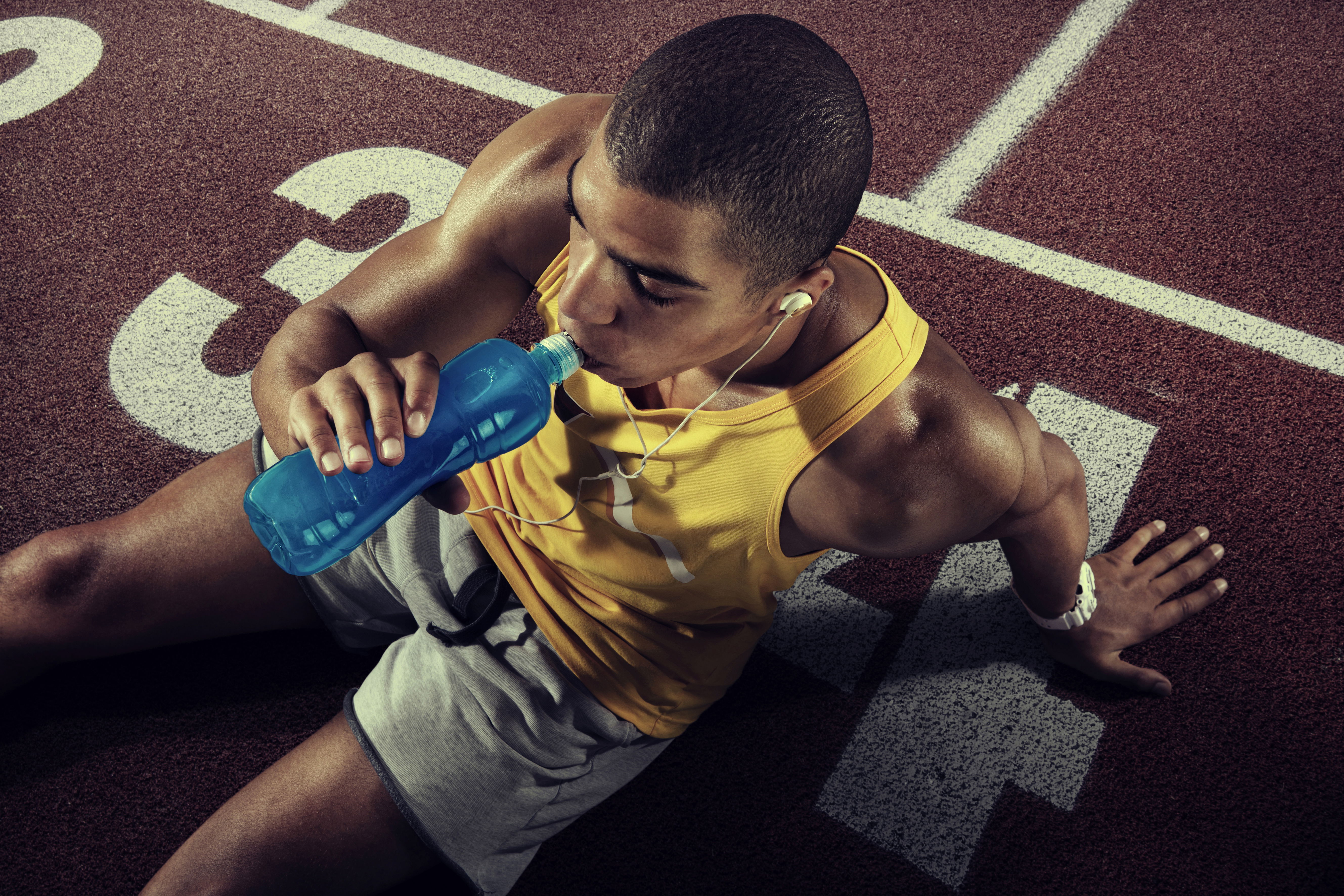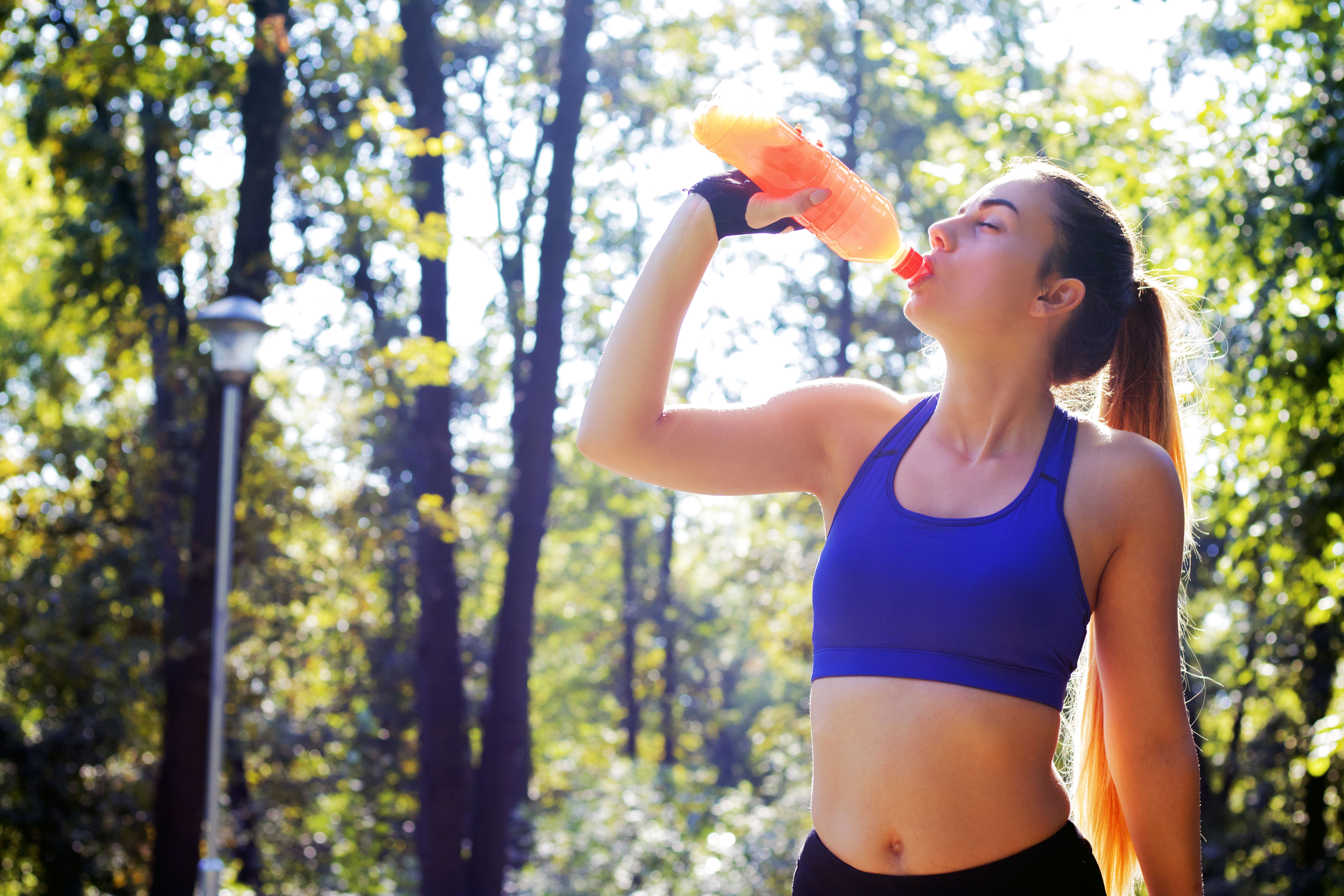Bebida deportiva que contiene electrolitos.

some information about sports drinks containing electrolytes:
Sports drinks are beverages designed to help replenish water, carbohydrates, and electrolytes that are lost through sweat during exercise or physical activity.
The electrolytes typically found in sports drinks include sodium, potassium, calcium, and magnesium.
The main purposes of the electrolytes in sports drinks are:
Sodium helps maintain fluid balance and supports muscle and nerve function. It is the primary electrolyte lost through sweat.Potassium is important for muscle contraction and nerve transmission. It also helps regulate fluid balance.
Calcium and magnesium play roles in muscle function and bone health.
Some common electrolyte-containing sports drink ingredients include:
Sodium (e.g. sodium chloride, sodium citrate)Potassium (e.g. potassium chloride, potassium citrate)
Calcium (e.g. calcium carbonate, calcium citrate)
Magnesium (e.g. magnesium oxide, magnesium citrate)
The electrolyte concentrations in sports drinks can vary, but are typically formulated to match the typical electrolyte losses in sweat during exercise.
Consuming a sports drink can help replenish electrolytes and prevent dehydration or electrolyte imbalances that can occur with prolonged physical activity.
Composition and Formulations:
The typical electrolyte composition of sports drinks includes sodium (typically 110-220 mg per 8 oz), potassium (30-80 mg per 8 oz), and smaller amounts of calcium and magnesium.The carbohydrate content is usually 6-8 grams per 8 oz, often coming from sources like sucrose, glucose, or fructose.
Sports drinks may also contain other ingredients like flavorings, preservatives, and acidulants.
Formulations can vary between brands and products to target different exercise intensities or durations.
Benefits of Electrolytes in Sports Drinks:
Helps maintain fluid balance and prevents dehydration during exercise.Replaces electrolytes lost through sweat, reducing the risk of electrolyte imbalances.
Supports muscle function, nerve transmission, and other physiological processes.
Can improve endurance performance and recovery compared to just drinking water.
Timing and Dosage:
Sports drinks are typically consumed before, during, and after exercise.Recommended intake is 4-8 oz every 15-20 minutes during exercise, depending on sweat rate.
Intake should be adjusted based on duration and intensity of exercise, as well as individual sweat and electrolyte
losses.Considerations:
Those with certain medical conditions may need to limit or avoid sports drinks (e.g. diabetes, kidney disease).Sports drinks should be used judiciously, as excessive intake can lead to calorie and sugar overconsumption.
Water is still important for hydration, and sports drinks may not be necessary for shorter, less intense activities.

Could you provide more details on the recommended electrolyte intake levels for different exercise durations and intensities?
some more details on recommended electrolyte intakes for sports drinks based on exercise duration and intensity:
Exercise Duration:
For exercise lasting less than 1 hour:
Electrolyte needs are generally met by normal dietary .intake. Water is the primary hydration need
Sports drinks may not be necessary unless the exercise is very intense.
For exercise lasting 1-2 hours:
Sodium intake of 400-800 mg per hour is recommended to replace sweat losses.
Potassium intake of 200-400 mg per hour is also beneficial.
Sports drinks provide a convenient way to meet these electrolyte needs.
For exercise lasting more than 2 hours:
Sodium intake of 600-1200 mg per hour is recommended.
Potassium intake of 200-500 mg per hour is ideal.
Sports drinks become increasingly important to replenish electrolytes and maintain fluid
balance.Exercise Intensity:
For light to moderate intensity exercise:
Electrolyte needs are lower, in the range of 400-800 mg sodium per hour.
Sports drinks with 100-200 mg sodium per 8 oz are often sufficient.
For high intensity exercise:
Sweat rates and electrolyte losses increase significantly.
Sodium intake of 800-1200 mg per hour may be required.
Sports drinks with 200-300 mg sodium per 8 oz are recommended.
For exercise in hot/humid environments:
Sweat rates and electrolyte losses are elevated.
Sodium intakes up to 1500 mg per hour may be needed.
Sports drinks with 300+ mg sodium per 8 oz are ideal.
The specific electrolyte needs can vary greatly between individuals based on factors like fitness level, acclimatization, and sweat composition.
Monitoring your individual sweat rate and electrolyte losses is the best way to determine your optimal sports drink intake.

Could you provide examples of sports drinks that meet the recommended electrolyte levels for high-intensity exercise?
some examples of sports drinks that meet the recommended electrolyte levels for high-intensity exercise:
Gatorade Endurance Formula:
Sodium: 200 mg per 8 oz
Potassium: 90 mg per 8 oz
This formula is designed for athletes engaged in prolonged, high-intensity exercise. The higher sodium content helps replace the increased electrolyte losses.
Powerade ION4:
Sodium: 200 mg per 8 oz
Potassium: 60 mg per 8 oz
This sports drink contains a blend of sodium, potassium, calcium, and magnesium to help replenish a wider range of electrolytes lost through sweat.
Skratch Labs Exercise Hydration Mix:
Sodium: 300 mg per 16 oz serving
Potassium: 80 mg per 16 oz
servingThis is a clean-label sports drink made with simple, natural ingredients like cane sugar, citric acid, and sea salt.
nuun Sport Electrolyte Drink Tablets:
Sodium: 300 mg per tablet (dissolved in 16 oz water)
Potassium: 100 mg per tablet
These dissolvable electrolyte tablets provide a convenient way to make your own sports drink with the right electrolyte profile.
BODYARMOR SPORT Drink:
Sodium: 210 mg per 16 oz bottle
Potassium: 90 mg per 16 oz bottle
This sports drink also contains coconut water and vitamins C and E for additional nutritional support.
The exact electrolyte needs can vary based on factors like sweat rate, exercise duration, and environmental conditions.
But these sports drinks should provide a good starting point to help replenish electrolytes during high-intensity workouts

How do the electrolyte and carbohydrate compositions of sports drinks compare to other hydration options like coconut water or fruit juices?
Great question! Let's take a closer look at how the electrolyte and carbohydrate compositions of sports drinks compare to other common hydration options like coconut water and fruit juices:
Sports Drinks:
Electrolytes: Sports drinks typically contain 110-220 mg sodium, 30-80 mg potassium, and smaller amounts of calcium/magnesium per 8 oz.Carbohydrates: 6-8 g per 8 oz, often from sources like sucrose, glucose, or fructose.
Coconut Water:
Electrolytes: Naturally contains 252 mg potassium and 45 mg sodium per 8 oz.Carbohydrates: 6-9 g per 8 oz, primarily from natural fruit sugar.
Fruit Juices:
Electrolytes: Minimal electrolyte content, typically less than 50 mg sodium and potassium per 8 oz.Carbohydrates: 20-30 g per 8 oz, from natural fruit sugars.
Key Differences:
Sports drinks have a higher sodium content to replace what's lost in sweat, while coconut water is higher in potassium.Fruit juices are much higher in total carbohydrates/sugars compared to sports drinks and coconut water.
Sports drinks are specifically formulated to provide an optimal balance of carbohydrates, electrolytes, and fluids for exercise hydration.
Coconut water and fruit juices can be good hydration options, but may not provide the full electrolyte replenishment needed for prolonged, high-intensity exercise.
The choice between these options depends on the specific needs - sports drinks tend to be better for replenishing electrolytes during exercise, while coconut water and juices can be good alternatives for everyday hydration or lower-intensity activities.
Monitoring how your body responds is the best way to determine the right hydration solution.
Comentarios